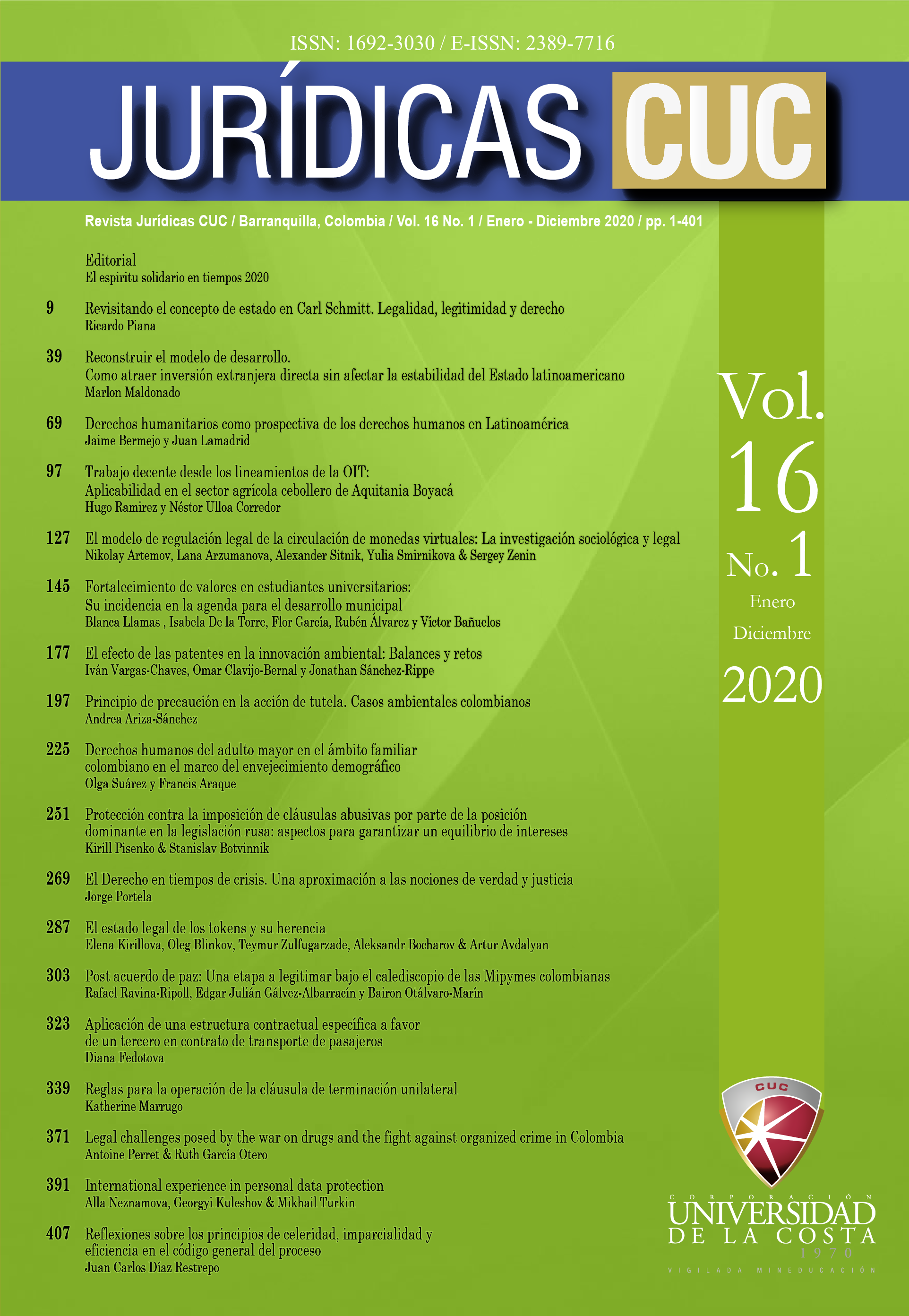Reflections on the principles of celerity, impartiality and efficiency in the General Code of the Process
DOI:
https://doi.org/10.17981/juridcuc.16.1.2020.18Keywords:
principle of celerity, inquisitive powers, principle of efficiencyAbstract
The present article reflects on certain provisions of the General Procedural Code in which the legislator has sought to make procedural steps swift and efficient, and the possible disadvantages of applying these rules in terms of affecting the principles governing procedural activity. To this end, and based on a dogmatic methodology, the principles of speed, impartiality and efficiency are analysed with a view to determining their scope and application parameters. Subsequently, the most relevant regulations that seek to materialize these principles are addressed, as well as the powers granted to the judge, as director of the process, to meet the goals set by the Legislator regarding celerity and efficiency. This analysis allows for the delimitation of the role of the judge within the General Code of Procedure, and proposes a reflection on how effective, proportional and useful some of the rules established by the procedural legislator can be to achieve a more expeditious and efficient administration of justice, and which can serve as a tool for litigants and officials of the Judicial Branch. The analysis concludes that the new code imposes greater demands on judges and grants them inquisitive powers that must be applied consistently and justifiably in order to achieve a balanced materialization of the principles of efficiency, speed and impartiality.
Downloads
References
Bujosa, L. (2013). Los principios del Código General del Proceso (ley 1564 de 2012) desde la perspectiva española. Revista General de derecho procesal, (13), 265–298. Obtenido de https://www.iustel.com/v2/revistas/detalle_revista.asp?id_noticia=413626
Carnelutti, F. (1975). Como se hace un proceso. Santiago de Chile: Juris.
Cubillos, H. (2017). El Estado de la Ciencia del Derecho Procesal en Colombia. Pensamiento Jurídico, (45), 269–345. Obtenido de https://revistas.unal.edu.co/index.php/peju/article/view/65678
Díaz, J. (2016). La carga dinámica de la prueba como modalidad de carga probatoria aplicada en el ordenamiento jurídico colombiano. Vulneración a la igualdad constitucional. Entramado, 12(1), 202–221. http://dx.doi.org/10.18041/entramado.2016v12n1.23123
Echandía, H. D. (1984). Teoría General del Proceso (3 ed.). Buenos Aires: Universidad.
García, M. y Ceballos, M. (2019). La profesión jurídica en Colombia. Falta de reglas y exceso de mercado. Bogotá, D.C.: Dejusticia. Obtenido de https://www.dejusticia.org
Herrán, O. (2013). El alcance de los principios de la administración de justicia frente a la descongestión judicial en Colombia. Prolegómenos, 16(32), 105–122. https://doi.org/10.18359/dere.757
Jarama, V., Vásquez, J. y Durán, A. (2019). El principio de celeridad en el código orgánico general de procesos, consecuencias en la audiencia. Universidad y Sociedad, 12(3), 314–323. Obtenido de https://rus.ucf.edu.cu/index.php/rus/article/view/1127
López, H. (2016). Código General del Proceso. Parte General. Bogotá, D.C.: Dupre.
Malem, J. (2008). El error judicial y la formación de los jueces. Barcelona: Gedisa.
Narajano, V. (2014). Teoría Constitucional e Intituciones Políticas (12 ed.). Bogotá, D.C.: Temis.
Prieto, C. (2003). El proceso y el debido proceso. Vuniversitas, (106), 811–823. Obtenido de https://revistas.javeriana.edu.co/index.php/vnijuri/article/view/14836
Prieto, L. (1998). Ley, principios, derechos. Madrid: Dykinson.
Quiroz, A. (2014). Nuevo modelo de gestión de los jueces y juezas en el sistema de oralidad en el área de familia en Colombia. Bogotá, D.C.: Consejo Superior de la Judicatura, Escuela Superior Judicial “Rodrigo Lara Bonilla”.
RAE. (2018). Diccionario de la Real Academia Española. [Online]. Disponible en http://dle.rae.es/srv/fetch?id=LRVtrWa
Ramírez, D. (2009). La prueba de oficio Una perspectiva para el proceso dialógico civil. Bogotá, D.C.: Universidad Externado de Colombia.
República de Colombia. Asamblea Nacional Constituyente. (1991).Constitución política de Colombia. Gaceta Constitucional, 1(114).
República de Colombia. Corte Constitucional. (14 de septiembre de 2016). Expediente D-11258. [Sentencia C-496]. M.P.: María Victoria Calle Correa. Obtenido de https://www.corteconstitucional.gov.co/relatoria/2016/C-496-16.htm
República de Colombia. Corte Constitucional. (24 de febrero de 2016). Expediente D-10902. [Sentencia C-086]. M.P.: Jorge Iván Palacio Palacio. Obtenido de https://www.corteconstitucional.gov.co/relatoria/2016/C-086-16.htm
República de Colombia. Corte Constitucional. (16 de octubre de 2014). Expediente T-3.955.581. [Sentencia SU-768]. M.P.: Jorge Iván Palacio Palacio. Obtenido de https://www.corteconstitucional.gov.co/relatoria/2014/SU768-14.htm
República de Colombia. Corte Constitucional. (15 de mayo de 2013). Expediente D-9324. [Sentencia C-279]. M.P.: Jorge Ignacio Pretelt Chaljub. Obtenido de https://www.corteconstitucional.gov.co/relatoria/2013/c-279-13.htm
República de Colombia. Corte Constitucional. (13 de noviembre de 2013). Expediente D-9623. [Sentencia C-826]. M.P.: Luis Ernesto Vargas Silva. Obtenido de https://www.corteconstitucional.gov.co/relatoria/2013/C-826-13.htm
República de Colombia. Congreso de la República. (12 de julio de 2012). Código General del Proceso y se dictan otras disposiciones. [Ley 1564]. DO: 48.489. Obtenido de http://www.secretariasenado.gov.co/senado/basedoc/ley_1564_2012.html
República de Colombia. Corte Constitucional. (6 de julio de 2011). Expediente D-8368. [Sentencia C-543]. M.P.: Humberto Antonio Sierra Porto. Obtenido de https://www.corteconstitucional.gov.co/RELATORIA/2011/C-543-11.htm
República de Colombia. Corte Constitucional. (2 de diciembre de 1998). Expediente T-152455. [Sentencia SU-747]. M.P.: Eduardo Cifuentes Muñoz. Obtenido de https://www.corteconstitucional.gov.co/relatoria/1998/SU747-98.htm
República de Colombia. Congreso de la República. (4 de marzo de 1996). Estatutaria de la administración de justicia. [Ley 270]. DO: 42.745. Obtenido de http://www.secretariasenado.gov.co/senado/basedoc/ley_0270_1996.html
República de Colombia. Corte Constitucional. (5 de junio de 1992). Expediente T-778. [Sentencia T-406]. M.P.: Ciro Angarita Barón. Obtenido de https://www.corteconstitucional.gov.co/relatoria/1992/t-406-92.htm
República de Colombia. Presidencia de la República. (5 de junio de 1992). Código de Procedimiento Civil. [Decreto 1400]. DO: 33.150. Obtenido de http://www.secretariasenado.gov.co/senado/basedoc/codigo_procedimiento_civil.html
Rodríguez, F. y Bolaño, N. A. (2018). De la valoración racional de la prueba en la verdad procesal a la teoría de la probabilidad preponderante. Jurídicas CUC, 14(1), 259–286. http://dx.doi.org/10.17981/juridcuc.14.1.2018.12
Rodríguez, F., & Tuirán, J. (2011). La valoración racional de la prueba. Jurídicas CUC, 7(1), 191–208. Obtenido de https://revistascientificas.cuc.edu.co/juridicascuc/article/view/421
Rueda, M. (2015). La raíz del Código General del Proceso. [Ley 1564]. Bogotá, D.C.: Uniandes.
Published
How to Cite
Issue
Section
License
Copyright (c) 2020 JURIDICAS CUC

This work is licensed under a Creative Commons Attribution-NonCommercial-NoDerivatives 4.0 International License.
The authors are exclusively responsible for the published articles, which do not necessarily reflect the views of the editorial committee.
JURIDICAS CUC respects the moral rights of authors who have assigned the property rights on the published materials to the editorial committee. In turn, the authors declare that the work they submit has not been previously published.


 English
English
 Español (España)
Español (España)



